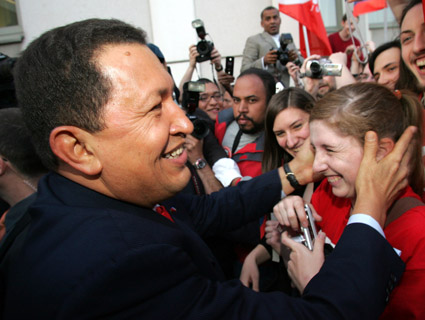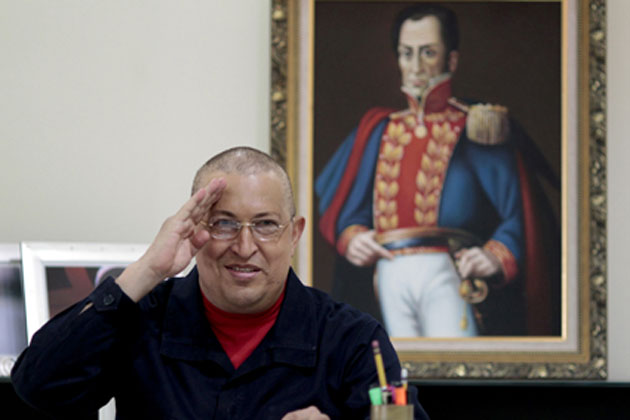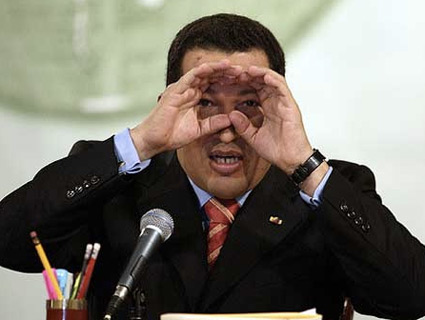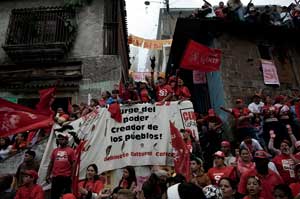
Venezuelan president Hugo Chávez greets admirers in Vienna, Austria, in 2006.<a href="http://www.shutterstock.com/cat.mhtml?lang=en&search_source=search_form&version=llv1&anyorall=all&safesearch=1&searchterm=hugo+chavez&search_group=#id=130512779&src=3AE99FCC-8830-11E2-AE00-E6F69DA4A24C-1-90">Northfoto</a>/Shutterstock
With the death of Venezuelan president Hugo Chávez, Latin America—and the world—lost one of its most polarizing leaders. Responses from the international community have ranged from devastated to celebratory, while the barrage of political postmortems in the United States has tended toward ambivalence (see here and here).
This isn’t surprising. Chávez was a contradictory figure: a champion of the poor who globe-trotted in a $65 million Airbus; a folk hero who feted Hollywood royalty and retained one of Caracas’ top fashion designers; an irrepressible showman whose recent private life remained a mystery. If at times he seemed like a throwback to an earlier generation of caudillos (most notably Fidel Castro, with whom Chávez shared an intense bond), he was nonetheless a populist, genuinely and rapturously loved by Venezuela’s poor.
His political legacy is decidedly murky. While chavistas are quick to praise the regime’s accomplishments—free education, free health care, reduced poverty, massive food and agricultural subsidies, a 93 percent literacy rate—the reality of day-to-day life in Venezuela tells a more troubling story. Caracas claims one of the world’s highest murder rates and a steady drumbeat of kidnapping, carjacking, and home invasion. One of its most notorious landmarks, the unfinished 45-story Tower of David, is now home to 2,500 squatters, a monument to the bungled economy.
And then there’s oil. Venezuela boasts the world’s largest petroleum reserves, which enabled Chávez to launch one massive social program after another, few properly managed and nearly all kept afloat on petrodollars and the Comandante’s sheer force of will.
Rory Carroll knows Venezuela’s tumult well. In 2006 he began reporting from the Guardian‘s Latin American bureau in Caracas, even scoring a cameo on Aló Presidente, the surreal weekly TV broadcast during which Chávez harangued, denounced, philosophized, sang, danced, and lambasted George W. Bush. Carroll has written a new book about the Chávez years, Comandante: Hugo Chávez’s Venezuela. It’s a vivid account of ordinary lives during the Chávez era, and the grueling, sometimes fatal, price his inner circle paid to remain near the seat of power. The following interview was conducted via email while Carroll is in Caracas.
Mother Jones: Let’s start with the positive: What did Chávez do right in Venezuela?
Rory Carroll: He put poverty at the heart of political debate. Rightly so, given the country’s immense inequality and poverty. He invested heavily in social programs such as literacy, health clinics, and education. He promoted Venezuela’s indigenous culture and urged compatriots to take pride in its pre-Columbian history. He called time on the US treating Latin America as its backyard.
MJ: If you compared the life of an average Venezuelan in, say, 1995 to their life now, what would be the biggest differences?
RC: More money, decay, polarization. Many of the poor have satellite dishes, smartphones, and white goods [i.e., major appliances] in their homes, the function of a decadelong oil boom and greater disposable income, subsidies, and handouts. Infrastructure, notably roads, bridges, and the power grid, has crumbled. Crime, bad in 1995, is now hideous, the function of a decayed judicial system. In 1995 Venezuelans hated only their government, now millions hate each other, cleaved between those who love and loathe Chávez.
MJ: Responding to you in the New Statesman, Richard Gott argued that “it is easy for the rare figure who speaks out against it [the American empire] to be viewed as an idiot or a despot.” How much did Chávez’s anti-capitalist rhetoric smear his image in Western media?
RC: Quite a lot. Confronting the US made him a target for demonization. Partisan and/or lazy journalism exaggerated his faults, ignored his virtues, and downplayed the influence of strident and on occasion anti-democratic opponents. The flip side is his anti-imperialist posturing so dazzled his cheerleaders they overlooked his flaws, flaws which worsened over time, and they created their own caricature.
MJ: American allies such as Honduras and Suriname have long records of corruption and human rights abuses, yet mainstream American media have largely overlooked those. Why did Venezuela—and Chávez in particular—trigger such criticism?
RC: Partly because Venezuela is much more important globally. Honduras and Suriname are economic and political midgets in comparison. And partly because Chávez had such name recognition. Praised or criticized, he was invariably newsworthy. The greater the limelight—and he was brilliant at getting and keeping it—the greater the scrutiny.
MJ: Chávez had a close relationship with the Castro brothers. What did they learn from each other?
RC: He learned how to leverage control of oil revenues into social programs which shored up his political base—he credited Fidel with the 2003 Barrio Adentro misión, which helped win him the 2004 recall referendum. It was Fidel who warned Chávez years later that the Cuban-run clinics in Venezuela’s slums were in crisis. Many had shut, others were barely functioning. Fidel never faced competitive elections himself but was attentive to threats to Chávez’s electoral success. Chávez and his allies also learned how to spy on opponents through Cuba’s G2 intelligence service, which took over much of Venezuela’s intelligence apparatus. From Chávez’s victory in 1998, Cuba learned that after decades of failing to export revolution they could gain allies in Latin America through the ballot box.
MJ: Over the last decade or so there has been talk of a Latin American “spring,” with leftist governments winning power in Brazil, Argentina, Bolivia, Ecuador, Paraguay, and Uruguay. Was Chávez’s ascendancy just part of a larger geopolitical shift in the region?
RC: Much of the spring was more nationalist and populist than leftist (something aggrieved trade union leaders and environmentalists in Bolivia, Ecuador, and Venezuela can speak to). Even so, Chávez was the pioneer of this leftist tide and blazed a path for the others. Probably they would have emerged anyway, but perhaps not as soon or forcefully. His strategy of rewriting the constitution, referendums, and abolishing term limits provided a blueprint for Evo Morales, Rafael Correa, and Daniel Ortega. He also emboldened the likes of Lula and the Kirchners to take stronger nationalist positions than they might otherwise have done. Chávez was part cause and symptom of this regional trend. However, the pupils have in many ways proven smarter than the master. Lula, Rousseff, Correa, and others have been more pragmatic and avoided his hubris. They are pursuing more sustainable models.
MJ: You can’t talk about Latin America without addressing the drug war. What was Chávez’s role here? He evicted the Drug Enforcement Agency and was accused of funding the Revolutionary Armed Forces of Colombia (FARC).
RC: Chávez inadvertently made the US drug war tactics look good. Quite a feat, given the disaster which is the drug war. After expelling the DEA (not necessarily a bad thing, given its record in Colombia and elsewhere), he failed to devise a credible strategy for Venezuela. Partly it was because his priority, for some years, was to cosset the FARC, and to turn a blind eye to his own top brass which made deals with narcos. Not because he himself was corrupt but because he valued the generals’ loyalty over honesty. Throw in neglect and politicization of the judicial system and you see the result: soaring rates of cocaine trafficking through Venezuela and worsening corruption of institutions.
MJ: Reporting on the gang warfare infecting Venezuela you write: “The gang’s struggle…showed in microcosm how Venezuela’s social contract shredded under Chávez. Forces were unleashed that gave [gang members] little choice but to trade childhood for a gun.” How are those forces different from conditions in Belém, San Pedro Sula, Maceio, Ciudad Juárez, and other violent Latin American cities?
RC: Chávez inherited a dysfunctional judicial system and more or less regional (that is to say: bad) crime rates. He leaves an anarchic judicial system and horrendous crime rates. He neglected, bungled, and politicized policing, the courts and the jails. Plus he gave a coded “It’s okay to steal if you’re poor” message. As crime exploded and threatened to cost him, electorally, he tried to row back. Police shot dead more than 500 people per year. One justice minister said dead gang members shouldn’t really be counted in murder rates because they were criminals. This echoes some trends elsewhere in Latin America. The difference is that Venezuela had oil revenues to do a better job, and at times progressive, encouraging rhetoric. But the results were disastrous.
MJ: How seriously did Venezuelans take Aló, Presidente? After 14 years it seems the broadcasts flattened reality so that everything from visiting a turnip patch to mobilizing the army had the same hysterical urgency.
RC: I took it seriously because it was an important news sources. Ordinary Venezuelans, less so. Ratings slumped over the years. Only a small minority watched it. But it still mattered. It set the agenda. Government officials and journalists watched and echoed it. Note Aló Presidente was just one part of Chávez’s media saturation. He would pop up almost every day of the week, often obliging all stations, state and private, to transmit him live.
MJ: Tell me about how you were treated as a foreign journalist in Venezuela.
RC: I was always treated with courtesy and friendliness by officials at the Ministry of Communication and Information. Access to officials for interview, however, was very difficult. Senior, mid, lower—didn’t matter, no one wanted to talk on the record. You seldom even got boilerplate spokesperson responses. Chávez was the only voice. No else one wanted to talk lest they inadvertently contradicted him or took some of the limelight.
MJ: There’s a quote in the book to the effect that “the easiest thing in the world is to fool a president.” Were there officials in Chávez’s inner circle who told him the truth?
RC: Fewer and fewer told him the unvarnished truth. But he wasn’t blinkered politically. Elections tethered him to reality. It focused him. Spontaneity and capriciousness was partly a strategy to reinforce his authority—no one else could do such things—but in the wider administration it was an unintentional product of his chaotic management style.
MJ: Chávez’s doctor publicly declared him bipolar, and you’ve documented the president’s laundry list of fears: assassination, coups, betrayal, earthquakes. How would you characterize Chávez psychologically?
RC: I don’t know if he was bipolar, but he certainly showed extreme mood swings and bursts of incredible energy. He was complex. Capable of great subtlety and sophistication, and charm, and didactic talent, when he so chose. But he also reveled in thuggish invective, bullying and humiliation. There was a crude amateurishness to his philosophizing.
MJ: How do you think the regime handled his health crisis?
RC: The government handled the crisis well. Hermetic information control enabled them to manipulate the news agenda. Something learned from the Cubans who mastered the art with Fidel’s illness.
MJ: What does a post-Chávez Venezuela look like?
RC: The opposition is cohesive, for now, but demoralized after its hammering in two recent elections. They know [former vice president and interim president Nicolás] Maduro is the favorite. Some of the more thoughtful ones wonder if it might be better to lose, so Maduro and chavismo inherit the mess and are blamed for it. I think Maduro will be able to rally supporters. He lacks charisma but is an astute power broker, a valuable skill given the rival factions within chavismo. The Bolivarian process was always a mishmash of ideology and pragmatism, its one guiding star was retaining power. Other than that there is no template.
MJ: If you were tasked with writing Chávez’s epitaph, what would it be?
RC: If only he ruled as well as he campaigned.















